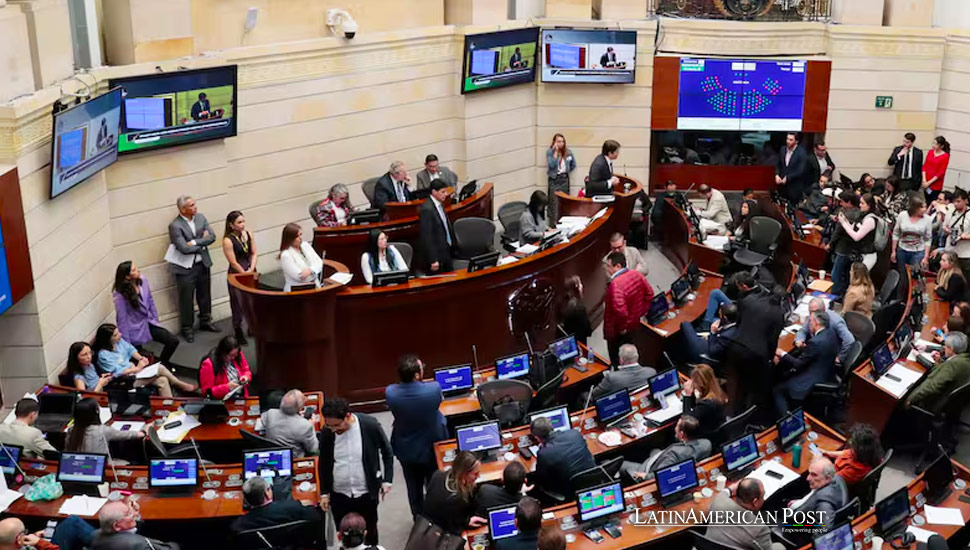Colombian Congress Approves Debt Ceiling Increase Amid Fiscal Concerns

Colombia’s Congress has approved a significant increase in the debt ceiling to $17.6 billion, enabling President Gustavo Petro’s government to finance its ambitious development plans and comply with payment obligations despite warnings from analysts about fiscal stability.
On Thursday, plenaries in Colombia’s lower house and Senate approved a request from President Gustavo Petro’s leftist government to raise the debt ceiling to $17.6 billion. This increase will finance the administration’s extensive development plans and ensure compliance with existing payment terms. The decision comes amid analysts’ warnings regarding the Andean nation’s fiscal health. It follows President Petro’s previous statements about the potential consequences of not raising the ceiling.
Economic committees from both legislative chambers had already approved the request the previous week. “This gives clear rules going forward about how to manage public credit,” stated Finance Minister Ricardo Bonilla following the measure’s approval.
Colombia’s current economic situation has raised concerns about how the government will manage its fiscal responsibilities. A recent decline in tax collection has exacerbated worries, with analysts estimating a budget shortfall of approximately $7 billion for the year. The government has announced plans to reduce spending by around $5 billion to help address this deficit.
Despite these measures, an independent oversight committee has warned that Colombia will not meet its fiscal rule this year. The budgetary rule, established in 2011, aims to prevent the deterioration of public finances by setting limits on deficit and debt levels. The committee cited factors such as lower economic growth, the potential negative impact on tax revenue, and high debt levels as reasons for this shortfall.
During hearings on the debt ceiling, Bonilla informed lawmakers that the existing ceiling would have resulted in a $1.37 billion deficit for 2024. This new increase aims to give the government the financial flexibility to implement its policies and meet its fiscal obligations.
Ambitious Reforms and Development Plans
President Petro has pledged to introduce substantial reforms in labor laws and healthcare, aiming to address what he describes as centuries of entrenched inequality in Colombia. These reforms are part of a broader four-year development plan approved last May, which seeks to reduce extreme poverty significantly, transition to clean energy, and redistribute land to poor farmers. The estimated cost of this comprehensive plan is around $300 billion.
One of the key measures recently approved by lawmakers is a pension reform intended to strengthen the state pension fund Colpensiones, reduce subsidies, and increase coverage for those without sufficient savings. This reform addresses long-standing issues within Colombia’s pension system and ensures more equitable access to retirement benefits.
The development plan also includes ambitious goals to cut the percentage of the population living in extreme poverty to single digits and to facilitate a transition to renewable energy sources. These initiatives are essential for achieving sustainable development and addressing socio-economic disparities in the country.
The increase in the debt ceiling is seen as a critical step to ensure the implementation of the government’s development agenda. However, it also raises important questions about Colombia’s long-term fiscal health. The finance ministry has stated that the new debt ceiling respects government deficit projections, revised upward to 5.6% of GDP last week.
Analysts have expressed concerns about the sustainability of Colombia’s fiscal policies, particularly in light of the country’s existing debt levels and the challenges posed by lower-than-expected economic growth. The recent tax collection slump highlights the government’s difficulties in generating sufficient revenue to cover its ambitious spending plans.
Moreover, the potential impact of global economic conditions on Colombia’s economy must be considered. Fluctuations in commodity prices, changes in international trade dynamics, and shifts in foreign investment flows can all influence the country’s fiscal outlook. As such, they are maintaining fiscal discipline and ensuring effective management of public finances, which will be crucial in the coming years.
Navigating Political and Social Dynamics
The approval of the debt ceiling increase also reflects the political dynamics within Colombia’s Congress. President Petro’s government, which has a solid leftist orientation, has faced both support and opposition in its efforts to implement its policy agenda. The passage of the debt ceiling measure indicates legislative backing for the administration’s plans. Still, it also underscores the ongoing debates about the best approach to achieving economic and social goals.
Public opinion will play a significant role in shaping the political landscape as the government moves forward with its reforms. Ensuring that the benefits of the development plans are widely felt and addressing the concerns of various stakeholders will be essential for maintaining public support. This includes effectively communicating the goals and outcomes of the reforms and demonstrating tangible improvements in people’s lives.
The success of President Petro’s development plans will depend on several factors, including the government’s ability to manage public finances effectively, navigate political challenges, and foster economic growth. The increase in the debt ceiling provides the financial space needed to pursue these goals, but it also necessitates careful fiscal management to avoid exacerbating the country’s debt burden.
International cooperation and support will also be necessary for Colombia’s development efforts. Engaging with multilateral institutions, securing foreign investment, and participating in global economic initiatives can help bolster the country’s economic prospects and provide additional resources for development.
Also read: Chiquita Found Liable for Funding Colombian Paramilitary Group
Approving the debt ceiling increase marks a significant milestone for Colombia’s government as it seeks to implement its ambitious development plans. The decision reflects the country’s opportunities and challenges as it strives to achieve economic growth, reduce inequality, and promote sustainable development. The coming years will be critical in determining the success of these efforts and their impact on the lives of Colombians.





